Next week marks 25 years since Vladimir Putin won his first election as Russian president.
During that time, the autocrat has outlasted five US presidents, four French presidents, three German chancellors and eight British prime ministers.
Three years after he ordered Russia's full-scale invasion of Ukraine, and despite repeated Western sanctions to hamper his regime's war economy, Mr Putin's main goal remains the same as it did in February 2022: Ukraine's capitulation.
The Russian leader's other maximalist demands remain the same too: No NATO membership for Ukraine (the Trump administration conceded this point even before talks between US and Russian teams began), the de-militarisation of Ukraine's armed forces, and Russia's full annexation of four eastern Ukrainian provinces, a demand he introduced last June.
All these terms are unacceptable to Ukraine.
If anything, Mr Putin appears more emboldened than at any point during the war as Russian forces grind farther into eastern Ukraine and push the remaining Ukrainian brigades out of Kursk.
His latest demand during his phone call with US President Donald Trump this week was for an end to all Western military aid and intelligence sharing with Ukraine.
This stubborn and unrealistic demand, would, in effect, leave Ukraine on its own to fight off Russia's invasion, which is what the Kremlin really wants to happen.
The readouts from this week's Trump-Putin phone call suggested that the tone of the conversation was cooperative, with Mr Putin raising issues beyond Ukraine, like the Middle East, almost as if he was reaffirming Russia's role in global affairs.
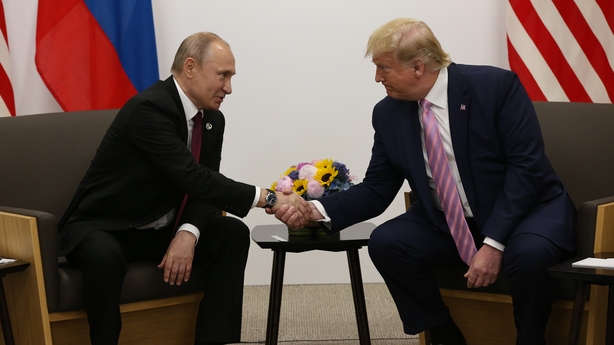
Despite Mr Trump's early bravado that he was going to get a deal done quickly to end the war, it is Mr Putin and not the US president who is driving the conversation.
During Tuesday's phone call, Mr Putin only gave a modicum of a concession - agreeing to a 30-day pause in Russian aerial attacks on Ukrainian energy infrastructure.
But even this promise could not be kept by the Russian side.
Russia has continued to launch drone attacks since Tuesday's phone call, striking Ukrainian energy sites and damaging nearby residential areas.
How has the Russian leader managed to set the agenda for talks?
It helps to have a US president who has heaped pressure on Ukraine, rather than on Russia, to end the war.
It also helps that Mr Trump has made it abundantly clear that he wants the war to end quickly.
Mr Putin is in no such rush and he is a patient negotiator.
He has continued Russia's war on Ukraine unabated for three years and has not changed course.
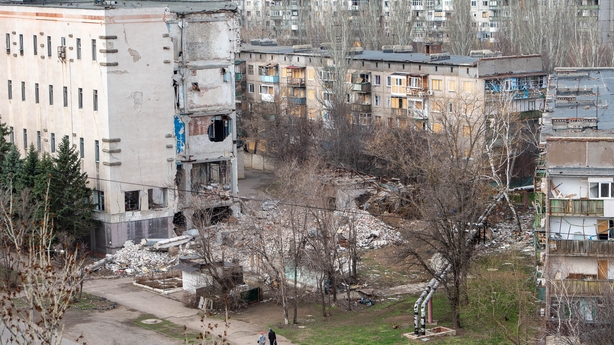
Writing in Foreign Policy this week, Laurie Bristow, a former UK ambassador to Russia, explained that Mr Trump's approach to negotiating with Mr Putin is "an open invitation to Putin to put forward maximalist demands and wait for others to meet them".
"Putin's response to Trump's proposed ceasefire demonstrates that Putin thinks he's negotiating from a position of strength. Putin is almost certainly counting on Trump's impatience for a deal - and his impatience with both Ukraine and his NATO allies - working to Russia's advantage," wrote Mr Bristow.
Projecting a position of strength is a tactic that Mr Putin lives by.
Read More:
Zelensky tells EU to keep pressure on Russia ahead of new talks
Trump says Ukraine truce bid 'on track' after Zelensky call
Latest Ukraine stories
Only last week, he visited Russian commanders in the Kursk region, dressed in combat fatigues to project an image of the war leader.
Unlike Ukraine's President Volodymyr Zelensky, who has repeatedly visited his Ukrainian troops on the frontlines during the war, visiting the Kursk front was a departure for Mr Putin.
It was a sign that the Russian leader feels assured that the outcome of the battle to retake Kursk is all but decided in Russia's favour. Otherwise he would not have risked such a PR stunt.
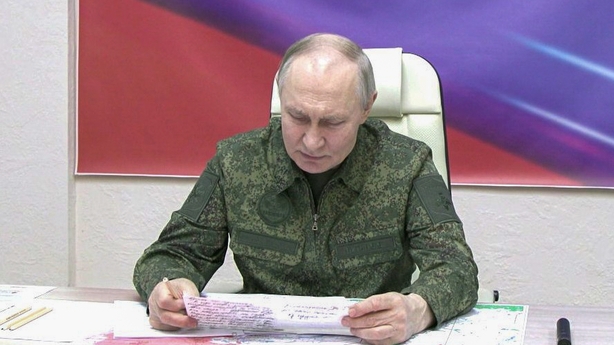
New demands from the Russian side, either from Mr Putin during his phone calls with Mr Trump, or through his senior negotiators like Russian foreign minister, Sergei Lavrov, also continue to land like punches.
Mr Putin on Tuesday said Western sanctions should be eased and for Ukraine to hold a presidential election - another absurd demand which tries to promote the Kremlin's narrative that Volodymyr Zelensky is an illegitimate president since his five-year term elapsed last May. (Ukraine is under martial law since Russia invaded and its constitution bars elections being held under such circumstances).
"This is one of the ways that the Soviets and the Russians negotiate. They come up with things that they present as being beyond question and already a given," Witold Rodkiewicz, a Polish expert on Russian foreign policy, told RTÉ News.
Europe's political establishment, he believes, largely misunderstands Mr Putin and Russia's approach to current talks.
"The Russians are not interested in negotiating terms of peace. They are only interested in negotiating the terms of surrender," said Mr Rodkiewicz from the Centre for Eastern Studies, a think-tank in Warsaw.
Russia also continues to reject the possibility of European peacekeepers being deployed to Ukraine, though it is Mr Lavrov who delivers this key demand instead of Mr Putin.
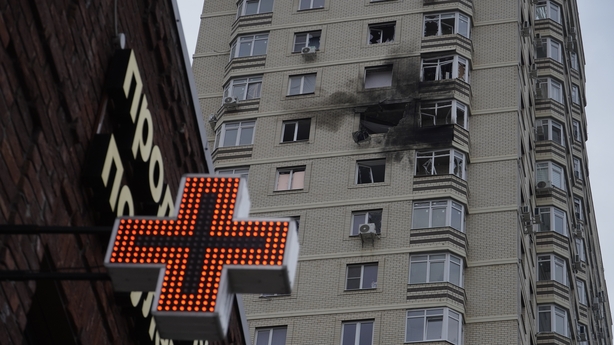
The Russian president also sees no division between conducting negotiations and waging war at the same time.
Mr Trump's original idea, which was supported by Ukraine at the Jeddah talks at the start of March, was that there should first be a full 30-day ceasefire across all fronts and then start negotiations.
The plan was de facto rejected by the Russians.
What Mr Trump got instead was that small concession from Mr Putin to halt aerial Russian assaults on Ukrainian energy sites (in return for Ukraine doing the same).
In effect, Russia's president has already managed to score a victory for his side because negotiations are ongoing whilst Russian forces advance on the battlefield.
Negotiate and wage war at the same time is the Russian tactic.
Mr Putin also managed to steer the conversation with Mr Trump towards Ukraine's armed forces, not Russia's, claiming that a temporary ceasefire might allow Ukraine to mobilise more soldiers and rearm.
But Russia will do exactly that, and use a limited 30-day ceasefire period to advance farther into Ukraine.
Mr Putin's current advantageous position has not all been down to Mr Trump's doing.
Russia's leader is a tough negotiator who can bluff and is willing to gamble.
All of Mr Putin's actions to-date on Ukraine, starting in 2014 with the illegal annexation of Crimea, have been taken with the understanding that the West will not intervene directly.
It's what Mr Rodkiewicz calls Mr Putin's "escalation dominance".
From the start of the war, Russia's president has known that, above all else, Western leaders want to avoid any escalation that gives to rise to nuclear threats.
That has changed in recent weeks with French President Emmanuel Macron openly calling Russia a "threat" to Europe and saying he was willing to start a debate on extending France's nuclear umbrella.
The Kremlin wants to avoid a doomsday scenario too, but that has not stopped Mr Putin from trying to scare the West, issuing indirect nuclear threats as a way to force the US, Canada, Europe and the UK to reduce their support for Ukraine.
At various stages of the war so far, he has made threats about the possibility of nuclear conflict should, in his view, Russia be threatened.
He first did so in his speech on 24 February 2022, announcing the start of Russia's so-called "special military operation" - its full-scale invasion of Ukraine.
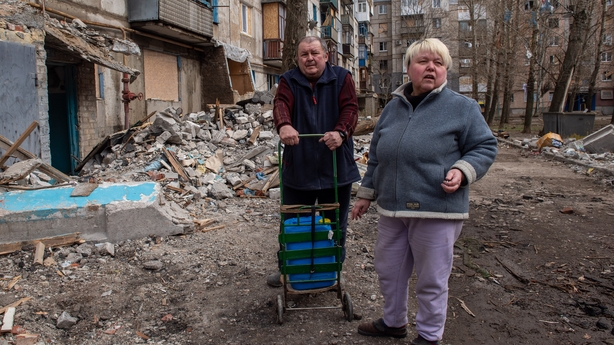
Again, in September 2022, he said that Russia would use all available means to protect itself, warning the West that, "this is not a bluff".
He continued with those kinds of statements throughout 2023, and ordered the deployment of Russian tactical nuclear weapons to Belarus in May that year.
And so it continued, until last November, when Mr Putin said that Russia had the right to strike countries whose weapons were used by Ukraine to attack Russian territory.
This was in response to the Biden administration's last gasp decision to allow Ukraine to use long-range missiles to attack targets in Russia.
However, in practice, Mr Putin chose a response that was radical but also nowhere close to what he had threatened, ordering Russian forces to fire a hypersonic missile - the Oreshnik - capable of carrying a nuclear warhead at a target in eastern Ukraine.
With Mr Putin, he frames each incident of escalation as a defensive Russian response to an aggressive policy pursued by the West.
The same thinking runs through one of his principle reasons for invading Ukraine: That he believes the West continues to threaten Russia's sphere of influence by expanding NATO membership eastwards to countries that border Russia, and which were former Soviet republics.
"What Putin is doing now is basically all the same things that the Soviet Union did, but in a more sophisticated way, with a better understanding of Western weaknesses," said Igor Gretskiy, a Russian foreign policy expert at Estonia's International Centre for Defence and Security.
The Russian leader, he said, is "very skillful in selling threats to the West", just as the Soviet Union did.
"Putin constantly reminds the West that Russia is a nuclear power. He never issues direct threats to the West, but people around him do, like [Dimitry] Medvedev," said Mr Gretskiy, a critic of Putin's regime who left his role as a prominent academic in St Petersburg for Tallinn in January 2022.
As things stand, Mr Putin is not being presented with worse odds by Mr Trump or his senior negotiators, enabling Russia to continue with their maximalist demands, as well as issuing new demands that Moscow knows Kyiv cannot accept.
But while the Trump administration has not yet pressured Russia to drop some of its hardline demands, Europe still holds a powerful card of its own here: its sanctions against Putin's regime, which the Russian leader wants eased.
Europe can use sanctions as a bargaining chip to get Russia to properly negotiate, instead of what it is currently doing, which is demanding Ukraine's dismemberment.
Failure to check Mr Putin's demands in Ukraine will cost Europe dearly.
After all, Russian policy since December 2021 demands that NATO withdraw its multinational battalions from Eastern Europe.
This remains Mr Putin's larger objective: to reassert Russian influence over Eastern Europe.
Even last week, he said that wants the "root causes of the crisis" to be addressed.
By "root causes", he means NATO's expansion eastwards in the late 1990s.
But joining NATO was a decision that the democratically-elected governments of Eastern Europe made for themselves, just as Ukraine wishes to be able to do today.
Mr Gretskiy believes that in order to be successful in negotiating with Mr Putin, the opponent always needs to be able to call his bluff.
"The West has plenty of opportunities to win this diplomatic game," he said.
"It has everything in terms of military industrial potential. The only thing that the West lacks is the political will".







